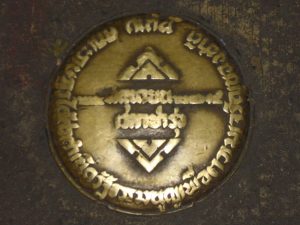A modest plaque has disappeared from the pavement at the Royal Plaza in Thailand. Arjun Subrahmanyan considers the wider significance of its removal
The recent disappearance of a plaque commemorating the 1932 revolution in Siam shows the suspicion over popular sovereignty that still prevails in the country. The event, staged by a group of commoners known as the People’s Party, ended the absolute monarchy and introduced constitutional democracy. In a region where state-enforced historical amnesia is rife today, Thailand has turned it into an art form.
The plaque was in itself a nondescript marker, sunk into the pavement at the Royal Plaza, which someone would have had to look out for to find. What threat did it pose? The answer mainly is its symbolic reminder that commoners revolted against the king and that democracy once did, and still does, matter to people.
The long reign of the Bangkok dynasty’s ninth king, from 1946 to 2016, has produced a powerful trope of ‘royalist democracy’.
In an impressive feat of mental gymnastics, this contortion has identified the monarchy as democratic, and the king of the 1930s as bestowing democracy on a grateful people. Nothing, in fact, could be further from the truth, then in pre-war years, or later.
But the damage to democracy, and any notion that it is a part of Thai social history, is real. The royal democratic swindle of what was a move against the king stemming from complex social forces has been abetted by a scepticism about all commoner movements for rights and freedoms.
Events of 1932
For much of the general public that is at all aware of what happened in 1932, scepticism about non-royal politics is expressed with a series of doubtful signifiers. Such an argument might go like this: in June 1932, the ‘People’s Party’ toppled the absolute monarchy in a ‘revolution’ that introduced constitutional ‘democracy’.

This line of reasoning presents the People’s Party as neither popular nor a party, but an oligarchic cabal bent on power. The revolution was a coup against established, sacred authority. The democracy introduced in 1932 was a sham, a power grab by people who used highly idealistic language that no one understood but which claimed to be the panacea for society’s ills.
Again, this makes no sense if the prior idea of a royal bestowal of democracy is maintained. But logical consistency does not much matter in the reasoning of power.
Who speaks for the Thai nation? A host of elite actors have repeatedly, but never the people as a whole.
Is the main legacy of 1932 then a mixture of contradictory ideas swept under the royalist doormat? Kingly bestowal, or an elitist sham democracy and military autocracy that people repeatedly have had to submit to out of despair or fear?
Defending democracy’s popular origins in Thailand seems like a doomed cause, and today a very dangerous one. But the revolution of 1932 changed everything. It was both an end and a beginning. It clearly was the end of the absolute kingship. Never again would royal authority go unchecked or unchallenged. Indeed, we have seen popular challenges to the institution recently that have referenced the 1932 revolution.
But what commenced in 1932? If it really was a revolution, it had to connote a new beginning connected to a notion of freedom.
For royalists in their negative moments, it certainly was a beginning: the opening of an arena for corrupt politicians to fight for power and wealth at the king’s and the public’s expense. Indeed, there is historical truth in this view. Public institutions that ostensibly checked power – courts, the legislature and supervisory bodies – had little independent legitimacy and only shallow social roots that could give them strength.
People’s Party revolution
There is, however, more to what happened. The People’s Party revolution, conceived and executed in secret, was much more than an oligarchic coup. It was apparent in the years after 1932 that the plotters had tapped into a long-simmering desire among educated society for greater control over their affairs and a political voice. This was the culmination of forty years of oppositional politics.
In 1885, the first constitutional demands were made of the king. He rejected them on the grounds of popular immaturity. The last major rebellion that sought popular rule in 1912 was exposed before it was executed. The 1932 revolution succeeded, and once accomplished crystallised the aspirations of wide swathes of educated society who had no relation to the People’s Party.
Alas, as we know, the revolution also brought the military into politics. But civilian, and citizens’ democracy, have pushed back against it
Using the popular press, the national assembly established by the revolution, the law and the religious and educational institutions, the young democracy identified a range of popular causes. It was alleged these would find their fulfillment in the new system. Alas, as we know, the revolution also brought the military into politics. But civilian, and citizens’ democracy, have pushed back against it.
From the early struggle, 85 years of democratic politics have been given institutional and public support.
In recounting the travails of the old European left, Slavoj Zizek famously said they failed, but we can fail better. The problem of where sovereign power lies still haunts Thailand. The unfinished revolution is under actual and symbolic attack, but the obituary will not, cannot, be written yet.
Featured image
Parliament House of the Kingdom of Thailand: suspicion of popular sovereignty still prevails. Photo: Wikimedia Commons
